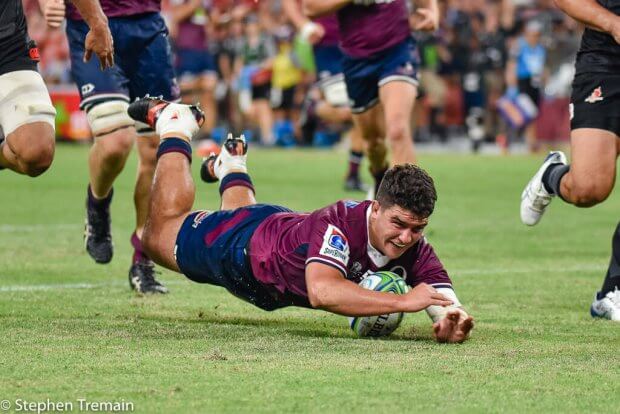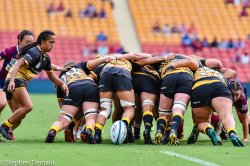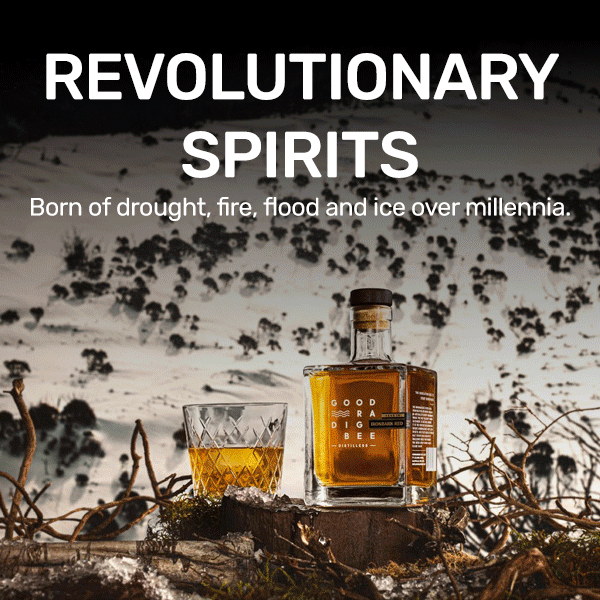Monday’s Rugby News looks at results from the Super Rugby and Super W, Wallabies attacking coach Scott Wisemantel plans to transform the Wallabies and new Waratahs CEO Paul Doorn attempting to upheave the struggling side.
[one_half last=”no”]
Super salvation
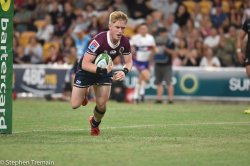
Round four of the Super Rugby season may go down as a turning point for many sides after an intense weekend of matches.
The action started in Christchurch where the Crusaders looked to impress in front of more than 50 returning legends. And boy did they put on a show, with four first-half tries from Codie Taylor, Tom Christie, Braydon Ennor and George Bridge setting the Crusaders on the path to a 33-13 victory.
It then moved on a trio of Australian fixtures, with the Rebels looking to upset a Sharks team yet to taste home soil. Whilst they put up a strong fight, the return of Curwin Bosch at flyhalf, who contributed 16 points, and a double to Makazole Mapimpi helped secure the 36-24 win for the Sharks in Ballarat.
The pain for Aussie fans looked certain to continue when the mumps-riddled Brumbies headed to Waikato to face the unbeaten Chiefs. However, the mumps appeared to give them super abilities, with four tries during the opening 45 minutes helping to secure a famous 26-14 victory. It was the first time in six years that they had won in NZ, along with breaking a 13-year drought in Waikato.
The Reds would continue the celebrations for Australian fans after a dominant 64-5 win over the Sunwolves. The Reds embraced being at Suncorp for the first time in 2020, taking a 36-0 lead into halftime. They would continue to put their foot on the throat of the Sunwolves, with ten different try-scorers crossing the line for the impressive victory.
It was then time for some South African conference action, with the unbeaten Stormers looking to cement their spot on the top of the ladder against the Jaguares. In front of their home crowd, they would score two tries in the space of eight minutes to maintain their unbeaten record.
Finally, we headed to the Loftus Versfeld, where the Bulls looked for their first victory in 2020 against the Blues. However, it was not meant to be, with a 80th-minute penalty from Otere Black earned the Blues a dramatic 23-21 victory.
[/one_half][one_half last=”yes”]
Super W produces classics
Some say the Brumbies historic win over the Chiefs was inspired by their woman’s side, who clinched a 25-22 win over the Rebels in a classic encounter.
The Brumbies led by as many as 14 points early in the match before the Rebels levelled scores up in the final stages.
It was then up to centre Sammi Wood to nail the winning penalty, maintaining their unbeaten start to the competition.
“The Rebels girls really gave it to us, but it was a really tough game today,” co-captain Jane Garraway said to Fox Sports.
“Our forward pack is strong; they were dominant. It’s good to be a halfback behind a good forward pack.”
Meanwhile, the Reds managed to somehow one-up their male counterparts with an 80-5 thumping win over Rugby WA.
After an opening-round bye, last season’s runners-up were eager to put in a strong showing, with prop Liz Patu crossing for three tries in the first half.
Maraea Tupai would also cross for a hat-trick, with the dominant showing impressing captain Lori Cramer.
“We had a trial last week and today we definitely stuck to our game plan a little more,” she said.
“We’ve got such a strong bench and so much depth in our squad. We had a lot of new faces today, so it’s real exciting for us going forward.”
However, the biggest statement came from the side who were on the bye, with the Waratahs overcoming Fijiana 20-5.
A two-tries-to-nil first half opened up a buffer for the Waratahs that the vistoris could never really pull back, with captain Grace Hamilton once again dominating the contest.
“Certainly a step up in intensity from last week and it’s certainly the challenge we were looking for and I’m pleased with the way the girls reacted to it,” coach Campbell Aitken said.
“It certainly sets us up nicely for the rest of the season but our challenge now is to aim up from here and not just accept this as the ultimate.
“We’ve got bigger challenges ahead.”
[/one_half][one_half last=”no”]
Smiling Stuart
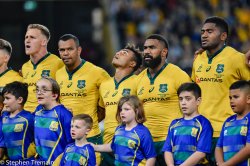
New Wallabies assistant Scott Wisemantel has preached a balanced attacking style for the national team as he prepares for life back home.
Wisemantel was the first addition to Rennie’s coaching staff, having served as Eddie Jones right hand at England over the past two years.
The 49-year-old revealed that the opportunity to come home and create change was a key factor in taking the job, eager to reunite with some familiar faces.
“I suppose post the World Cup with England, I had a choice: Do you go and do the same thing again for 1-2 years and then look at potentially another four-year cycle or do you come back home, and this is home, and then have a dig here and try and create some change’,” he said.
“That was one appealing factor and then the other appealing factor was the fact that I knew some of the staff coming back, I know Dave, I know Matt Taylor, I know Scotty Johnson, I know Chris Webb so that was appealing as well.
“The other thing is it’s a team you love – you love the Wallabies. If you grow up and you support rugby, it’s the pinnacle so it’s really nice to come back.”
As the attack coach, Wisemantel has revealed that he wants to see a balanced approach between running and winning rugby, hoping to develop players who can adapt to all scenarios.
“it’s just a bit of balance,” he said.
“Whether it’s run, kick, defend, all sort of bends into each other so you’ve just got to be really good at each of those areas and then the transitions between them.
“So, I think it’s about balance.”
He comes into the job well aware of the powers of their Northern Hemisphere rivals, believing that we have a tendency to underestimate them.
“You look at the current French team, that has the potential to be an absolute great team and they’ve got depth, they’ve got depth coming through,” he said.
“I look at the English system, there’s depth, and the other thing is they’re battle-hardened.
“Unless you’ve been there, you’ve experienced it, (you can underestimate them) and it can be a grind at times but there are diverse tactics, it’s not just one way to play the game.
“There’s teams there that play totally differently and they still win, it’s an education process.”
[/one_half][one_half last=”yes”]
Not all Doorn and gloom
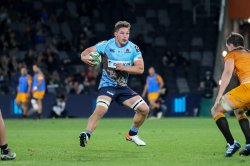
Paul Doorn is preparing to take on one of the toughest jobs in Australian rugby: trying to find a way to turn around the struggling Waratahs.
Doorn is preparing to take over the CEO role from Andrew Hore, with the former Venues NSW set to start on Wednesday.
Naturally, he has been already fielding questions about the role, most particularly why in the world would you decide to get involved at this stage?
“I’ve had a few people say the same thing to me, but it’s a fantastic opportunity,” Doorn said.
“When you think about the Waratahs brand representing the state, I’ve come from a job in which I’ve been proactively promoting state-owned assets for a while.
“To take on a challenge – and it is a challenge – to look for the best out of what the game can bring to people, I think it’s a huge opportunity.”
Doorn has already been in contact with new Waratahs coach Rob Penney and has spoken to various stakeholders within the rugby community.
“I did my due diligence talking to ex-players ex-officials, board members,” he said.
“I had a relationship with Andrew (Hore) the last couple of years through his work when they (the Waratahs) came out and played out at Bankwest, so I’ve come in with eyes wide open.”
Naturally, his main concern to trying to reverse the trends off the field as Penney works trying to do the same on the field, with the side recording their lowest attendance ever against the Blues a fortnight ago.
Whilst many would see their dwindling attendance rates and nomadic status as a challenge, Doorn believes that it represents a significant opportunity for growth.
“I know this year we’re playing six different home game (venues) which is a disadvantage,” Doorn said.
“But also a huge opportunity to engage with a whole new set of markets that perhaps we haven’t done, or haven’t done as regularly as we have in the past.”
[/one_half]

